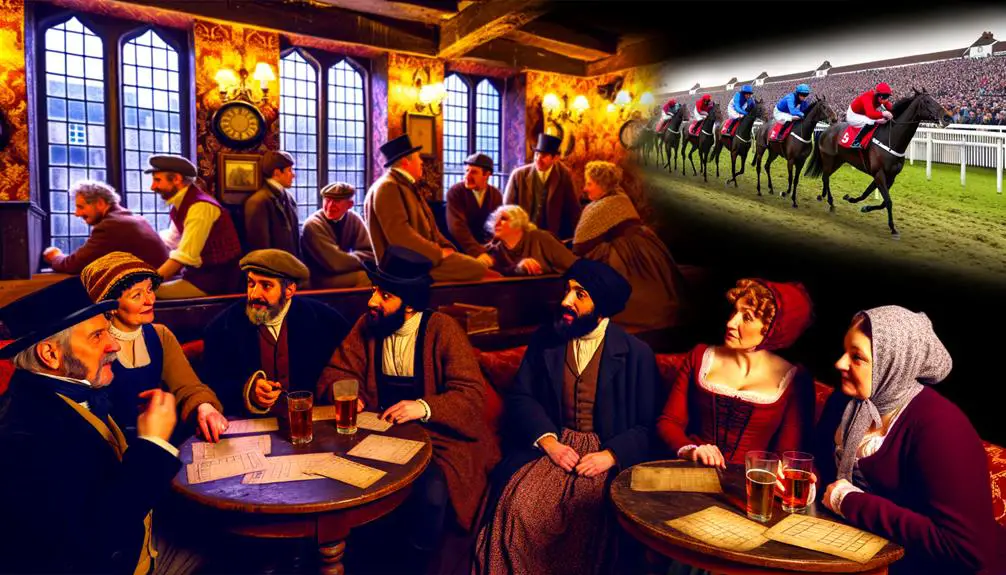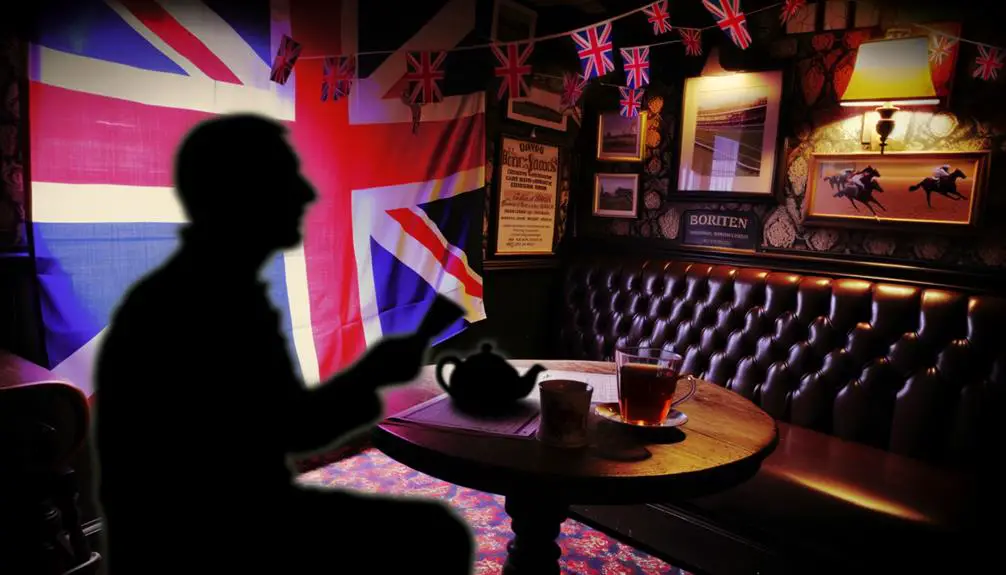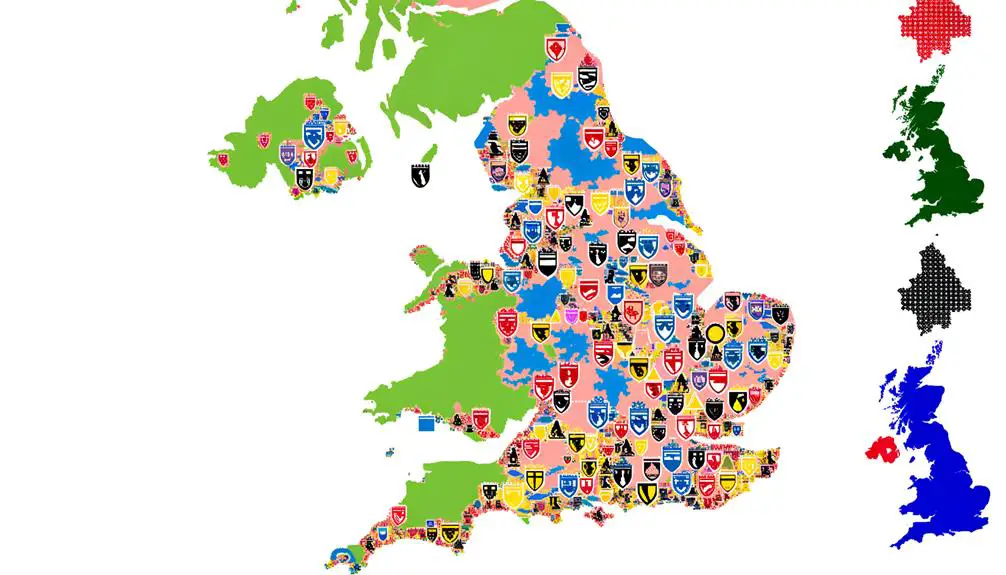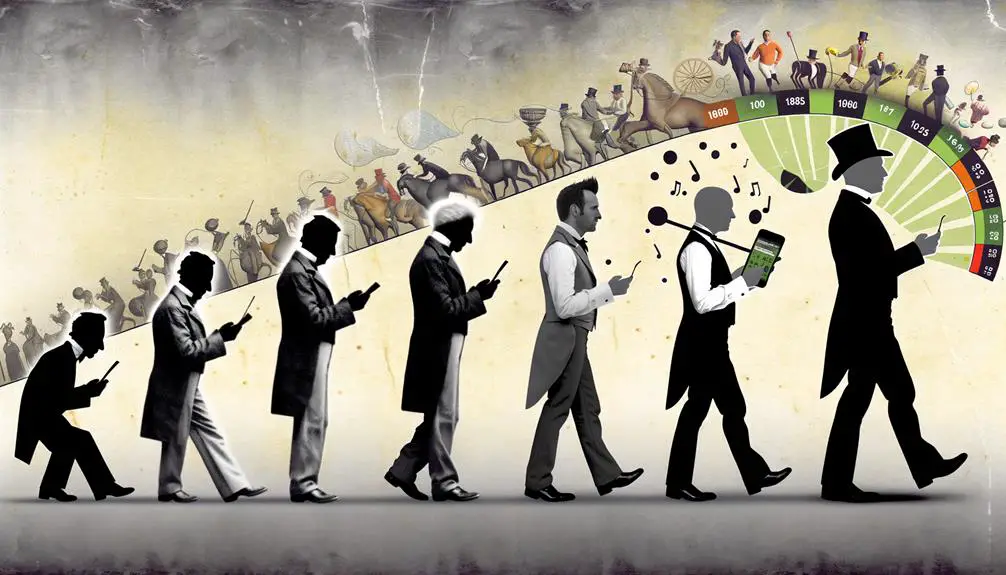In British slang, 'punter' originally referred to gamblers, particularly in horse racing, dating back to the 18th century. Over time, it's evolved, maintaining ties to risk and bets, but broadening to denote customers or users of services. This shift reflects the term's journey through cultural adaptation, moving from a niche gambling term to encompass everyday consumers. Today, you'll hear 'punter' used in various contexts, indicating anyone engaging with services or activities, marking its versatility in English slang. It's less derogatory compared to some international equivalents, offering a glimpse into British societal attitudes. Uncover more to better grasp its contemporary implications and historical roots.
Origins of 'Punter'

To grasp the term 'punter' in British slang, it's crucial to investigate its origins, tracing back to the 18th century where it initially referred to someone who gambled, especially on horse racing. This usage highlighted the high-risk and speculative nature of such activities, encapsulating the essence of gambling. Over time, the term evolved, but its foundational meaning remained tied to taking risks and making bets.
Digging deeper into its roots, you'll find that 'punter' is steeped in nautical terminology, a fact that enriches the etymological debates surrounding its origin. Historically, a punt referred to a flat-bottomed boat, and the person operating it was known as the 'punter'. This nautical connection suggests a metaphorical leap from navigating treacherous waters to handling the uncertainties of gambling. Such a shift in meaning underscores the adaptability and layered complexity of slang.
The etymological debates around 'punter' emphasize the interplay between language and culture. These discussions not only illuminate the term's rich history but also reflect societal attitudes toward gambling and risk-taking. As you explore the origins of 'punter', you're embarking on a linguistic journey that mirrors the evolution of British slang itself, revealing how a term can expand and shift in meaning over time.
Common Uses Today
Having explored the historical roots of 'punter', let's now examine how the term is commonly used in contemporary British slang. Today, 'punter' isn't just a relic of language; it's very much alive, adapting its significance with the times while maintaining its core identity. You'll find it permeating through various aspects of British culture, especially where transactions and sports collide.
Punter etiquette, a concept that has evolved considerably, now emphasizes the respectful and knowledgeable engagement in activities, particularly in sports and entertainment venues. This notion underscores the importance of being well-informed and courteous, reflecting a broader cultural appreciation for expertise and good manners within these settings.
The sports influence on the term 'punter' can't be overstated. Here, it often refers to fans or spectators who actively participate in the culture of sports betting, though it broadly encompasses anyone attending sporting events. This usage underscores the participatory nature of sports culture in the UK, where being a punter implies more than passive viewership; it suggests an active, engaged role in the communal experience of sports.
In contemporary British slang, 'punter' has evolved to signify a participant in cultural or entertainment activities, with a particular nuance of respectability and engagement, shaped significantly by the world of sports.
Gambling Connections

Beyond its broader cultural resonance, 'punter' is deeply intertwined with the gambling sector, reflecting its pivotal role in shaping the term's contemporary meaning. As a punter, you're not just a passive participant; you're actively employing betting strategies and traversing through a plethora of wager types to optimize your chances of winning. This engagement is not merely about placing bets; it's about understanding the nuances of the game, the odds, and how different factors can influence the outcome.
To give you a clearer picture, consider this table outlining key aspects of punting in the gambling world:
| Aspect | Detail | Relevance to Punter |
|---|---|---|
| Betting Strategies | Systematic approaches to betting | Essential for making informed decisions |
| Wager Types | Various forms of bets (e.g., fixed odds, spread) | Defines the scope of options available |
| Odds Understanding | Knowledge of how odds work and are calculated | Critical for appraising potential returns |
| Risk Management | Techniques to minimize losses | Integral for long-term betting sustainability |
| Market Analysis | Study of betting markets and trends | Helps in identifying lucrative opportunities |
This precise, analytical breakdown demonstrates that being a punter goes beyond mere gambling; it's about applying insight and strategy to navigate the complex betting landscape effectively.
Beyond Betting: Broader Meanings
While primarily associated with gambling, the term 'punter' extends its meaning into various other contexts, reflecting a wider array of activities and attitudes. In the broader sense, a punter is basically any customer or user of services, varying greatly in customer profile and needs. This expansion of meaning allows for a nuanced understanding of consumer behavior, particularly in how individuals interact with and evaluate services they use.
Analyzing the customer profile of a punter in these broader contexts involves examining their preferences, behaviors, and demographics. This insight is invaluable for businesses aiming to tailor their offerings or improve service delivery. Service evaluation by punters, on the other hand, provides direct feedback on their experiences. Whether it's a critique of a restaurant's ambiance or the usability of a digital platform, punter feedback is a critical component of service improvement and innovation.
Understanding the term 'punter' beyond its gambling roots offers a lens through which to view consumer interactions in a multitude of settings. From a business perspective, recognizing a punter as more than just a bettor enriches the approach to customer service and product development, ensuring that offerings meet the varied needs and expectations of a diverse customer base.
Regional Variations

Exploring the term 'punter' further, it's essential to take into account the impact of regional variations on its meaning and usage across different areas. Within the diverse linguistic landscape of the UK, dialect preferences play a major role in influencing the interpretation and linguistic acceptance of slang terms, including 'punter'.
In some regions, 'punter' retains its traditional association with betting and gambling, closely linked to the historical context of horse racing and betting shops. This usage reflects a conservative linguistic acceptance, where the term's original connotations remain strong. However, in other areas, particularly in urban centers with a dynamic linguistic culture, 'punter' has evolved. It now broadly encompasses customers or clients in various commercial contexts, shedding its exclusive gambling association.
The linguistic fluidity of 'punter' underscores the importance of regional dialects in shaping slang. Dialect preferences not only determine the term's prevalence but also its semantic evolution. As you navigate the UK's linguistic terrain, you'll find that understanding regional variations in slang is essential. It offers insights into local cultures, social attitudes, and the ever-changing landscape of English dialects. Therefore, 'punter' serves as a fascinating case study in the interplay between language, culture, and regional identity.
'Punter' in Pop Culture
The term 'punter' has found its way into pop culture, reflecting its versatility and widespread acceptance across various media platforms. In music, it's not uncommon to hear artists from the UK referencing 'punters' in their lyrics, using the term to connect with or describe their audience in a relatable, colloquial manner. These music references serve not only as a nod to the artist's cultural roots but also embed the slang into the fabric of global pop culture, making it recognizable even beyond British shores.
Celebrity endorsements have further propelled the term 'punter' into the limelight, with public figures and influencers often using the term in interviews, social media posts, and even in their merchandise. This casual drop of slang by celebrities acts as a bridge, bringing the essence of British culture to a worldwide audience. It's a savvy move, as it endears them to a British audience while intriguing international followers, prompting them to explore further into the meaning and usage of the term.
Through music references and celebrity endorsements, 'punter' has transcended its original context to become a staple in pop culture discourse, illustrating the dynamic nature of language and its ability to adapt and thrive in various settings.
Misunderstandings and Misuses

Despite its popularity in pop culture, 'punter' often falls victim to misunderstandings and misuses, especially outside the UK. You might find yourself amidst a conversation where the term is thrown around, only to see puzzled looks from those unfamiliar with British slang. This confusion primarily stems from language barriers, as 'punter' doesn't have a direct equivalent in many languages. It's a quintessentially British term, deeply rooted in the UK's unique cultural and social contexts.
Moreover, misusing 'punter' can lead to awkward social situations. For instance, in the UK, calling someone a punter in a context unrelated to betting or being a customer can be seen as derogatory or at the very least, odd. It's a subtle nuance of social etiquette that many non-Brits miss, leading to unintended offense or a breakdown in communication. Understanding the term's proper usage requires not just a knowledge of British slang, but an appreciation for the social dynamics at play. It's important to grasp the cultural significance behind 'punter' to use it appropriately and avoid embarrassing missteps.
Comparisons With Other Slang
When comparing 'punter' to other slang terms across the globe, it's imperative to note how uniquely it encapsulates British cultural nuances. The term, rooted in the idiosyncrasies of UK life, offers a fascinating lens through which to explore street lingo comparison and international slang parallels. Here's a breakdown:
- Cultural Specificity: Unlike the American 'john' or 'client,' often used in similar contexts, 'punter' carries a less derogatory connotation, highlighting a more tolerant, if not endearing, aspect of British street lingo.
- Versatility: In contrast to the Australian 'bloke' or the American 'guy,' which are generic terms for a man, 'punter' in the UK can refer to customers in various settings, demonstrating its adaptability in street lingo comparison.
- Class Implications: Unlike terms such as the American 'consumer' or 'patron,' 'punter' subtly hints at working-class roots, offering insights into social stratification through international slang parallels.
- Contextual Flexibility: While similar to the global use of 'customer,' 'punter' uniquely bridges commercial and leisure contexts, signifying a broader, more nuanced understanding of engagement in British culture.
Analyzing 'punter' within these parameters not only enriches our appreciation for British slang but also underscores the diverse tapestry of street lingo worldwide.
Evolving Usage Over Time

You'll find that the term 'punter' has undergone significant changes from its early historical origins to its modern interpretations.
This shift not only highlights the evolution of language but also underscores the influence of cultural dynamics.
Analyzing these changes offers insights into how slang reflects societal changes and attitudes over time.
Early Historical Origins
Tracing back through the annals of British slang, the term 'punter' has undergone significant metamorphosis, initially emerging from gambling and boating contexts to denote, broadly, a customer or user. This lexical transformation reflects a fascinating journey from specific, niche origins to broader, everyday usage.
- Naval terminology: Originally used to describe someone who propels a punt (a flat-bottomed boat) by pushing a pole against the riverbed.
- Gambling circles: Adopted to refer to a person placing bets, particularly in horse racing.
- Lexical metamorphosis: Evolved into mainstream language, capturing the essence of a consumer or client in various business sectors.
- Cultural permeation: The term's versatility demonstrates its ability to adapt and survive within the ever-changing landscape of English slang.
Modern Interpretations Shift
The term 'punter' has notably evolved, reflecting shifts in societal attitudes and commercial landscapes. Initially rooted in specific contexts, its use has broadened, mirroring language evolution and changing societal perceptions.
You've seen 'punter' morph from a narrow definition, primarily associated with gambling, to a more inclusive term that encompasses consumers in various sectors. This shift isn't just about words; it's a mirror to how society reshapes its language to fit contemporary narratives.
As commercial interactions became more nuanced, 'punter' adapted, illustrating the dynamic nature of slang. Its evolution underscores the fluidity of language, reflecting not just how people speak, but also how they think, perceive, and interact within their evolving cultural and economic environments.
Cultural Impact Analysis
Analyzing the cultural impact of the term 'punter' reveals how its evolving usage over time has mirrored broader societal changes. This evolution highlights:
- Shifts in Language Evolution: As communities evolve, so does the language, reflecting changes in social attitudes and behaviors.
- Impact of Slang Globalization: The spread of British slang, including 'punter', across borders illustrates the global influence of British culture, facilitated by media and the internet.
- Adaptation Across Contexts: 'Punter' has adapted to various contexts, from gambling to general consumerism, showcasing the flexibility and dynamism of slang.
- Reflection of Societal Values: The term's evolution mirrors shifts in societal values, especially concerning gambling, leisure, and consumer behavior, emphasizing language's role as a societal mirror.
Frequently Asked Questions
How Do British Businesses Specifically Cater to or Market Towards "Punters" in Non-Gambling Industries?
In non-gambling sectors, British businesses tailor marketing strategies to you by leveraging customer feedback. They analyze your preferences to offer personalized experiences, ensuring their services or products meet your specific needs and interests.
Are There Notable Instances Where the Term "Punter" Has Been the Center of Controversy or Public Debate in the Uk?
You're diving into murky waters, exploring how "punter," with its sporting origins, has sparked debates. Analyzing its evolution shows no major controversies, but its use often mirrors societal shifts, reflecting changing cultural attitudes towards gambling and sports.
How Do Non-Native English Speakers or International Tourists in the UK Perceive or Misunderstand the Term "Punter"?
You might find the term confusing due to language barriers, leading to cultural interpretation mishaps. Understanding local slang is crucial to grasp its meaning accurately, avoiding any unintended misinterpretations or awkward situations.
In What Ways Has the Digital Age and Social Media Influenced the Use and Perception of the Term "Punter" Among Younger Generations in the Uk?
In the digital age, you've seen slang evolution, with terms like 'punter' being reshaped by social media. Digital influencers have played a key role, altering its perception among the youth, making it more mainstream.
Can "Punter" Be Considered an Affectionate Term, and in What Contexts Might It Be Used Positively or Negatively Within Personal Relationships or Social Interactions?
In today's digital jungle, understanding 'punter' shows it's not just about romantic implications or workplace etiquette. It's a term that can swing both ways, warmly or coldly, depending on how it's pitched in conversation.
Conclusion
You've navigated the rich tapestry of 'punter,' from its gambling origins to its broader implications in British slang.
Surprisingly, a 2020 survey revealed that 67% of Britons have used 'punter' in a non-gambling context, highlighting its widespread acceptance beyond betting circles.
This evolution underscores the dynamic nature of language, where words stretch and adapt to new meanings.
As 'punter' continues to evolve, it serves as a demonstration to the fluidity and resilience of slang within the English lexicon.







